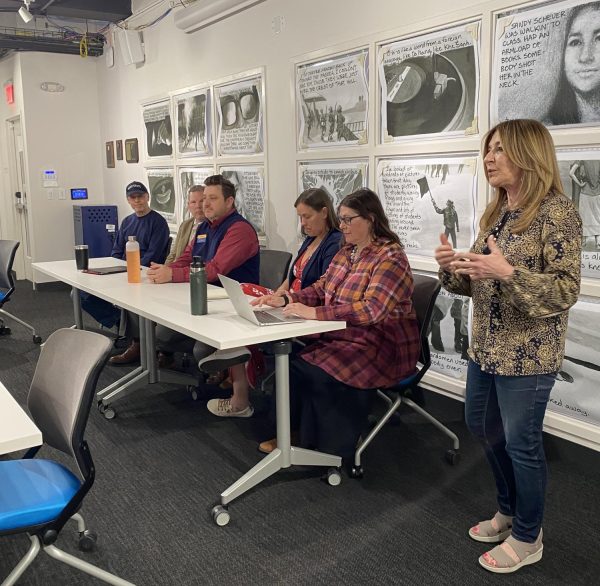Drastic weight-loss methods negatively affect health
September 14, 2006
Instead of turning to fad or crash diets, Rebecca Agrast focused on lasting results when dealing with the Freshman 15.
“I would walk a few miles a day with friends and cut out my snacks,” Agrast, sophomore early childhood education major, said.
Although some students manage their weight successfully, others decide to take risky dieting approaches.
Deanna Lavanty, registered and licensed dietitian and nutrition instructor, said some common forms of dieting used by college students include calorie restriction, avoidance of certain foods, use of diet aids and increasing physical activity.
She said calorie restriction can be dangerous because an individual may cut calorie intake to levels that are too low to maintain health.
Another common form of dieting used by college students is to avoid certain food groups that are thought to be fattening, Lavanty said.
“Although the carbohydrate craze seems to be simmering down, individuals still seem to limit carbohydrate intake,” she said.
Freshman architecture major Johnathan Brodack said hes tried taking all sweets out of his diet. After discovering this wasn’t effective, he said he realized it’s not good to remove anything from your diet.
“Something that all students should understand is that the best diet includes balanced meals and regular exercise,” Brodack said.
Two other dieting forms Lavanty mentioned were the use of diet aids and increase in physical activity. She said students may resort to using over-the-counter diet pills, herbal remedies or even laxatives.
She also said there are many risks involved with these types of diets.
Lavanty said dehydration, electrolyte imbalance and muscle loss may occur from limiting carbohydrate intake or using diuretics and laxatives.
She also said herbal supplements and diet remedies are extremely risky because the U.S. Food and Drug Administration has not evaluated the safety of these products.
“When you buy a supplement you cannot be 100 percent sure the product contains what it claims, will do what it claims, nor that it is safe,” Lavanty said.
When dieting, Lavanty said it’s important to consult with a registered dietitian at least two to three times. She said the dietitian will evaluate eating behaviors, provide a calorie/meal plan to help reach one’s goal and provide encouragement and support.
Agrast said her friends gave her moral support while exercising with her.
“Reducing calorie intake to an appropriate level that meets the individual’s nutrient needs, while increasing physical activity, can be very effective,” Lavanty said.
In order to stay healthy and keep weight in balance, she advises students to get plenty of sleep. Some other ways to stay healthy, she said, are to eat five small meals a day, stick with fresh fruits and vegetables and stay physically active.
In order to diet effectively, Lavanty said the most important thing to do is think long-term. She said to set reasonable goals and to focus more on health and well-being.
“Don’t lose sight of the fact that changing your eating and physical activity behaviors takes time,” she said. “Be happy with every little change you make.”
Contact Student Life reporter Nedda Pourahmady at [email protected].
























